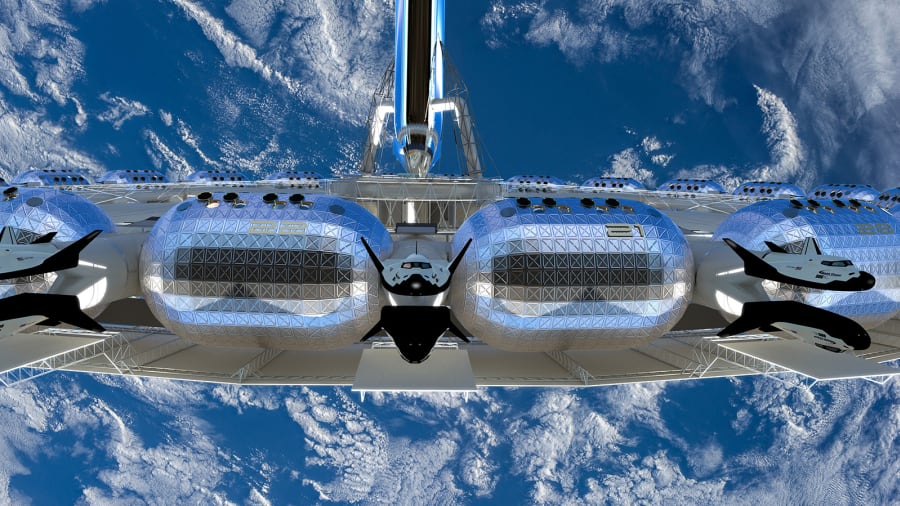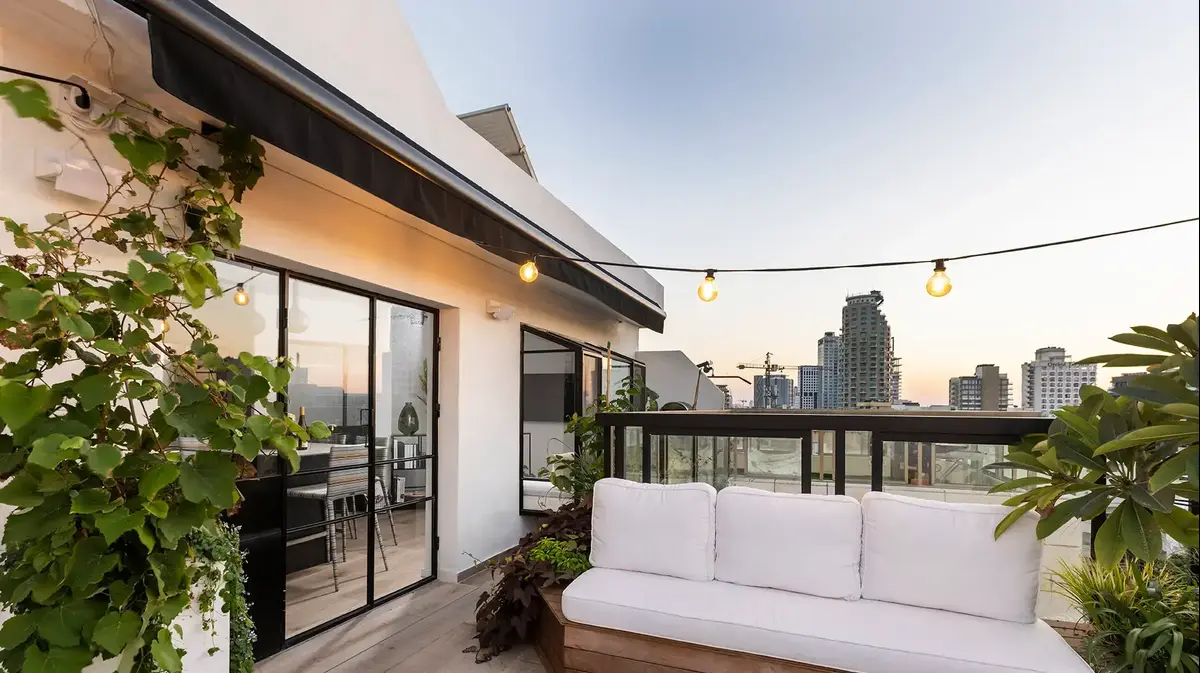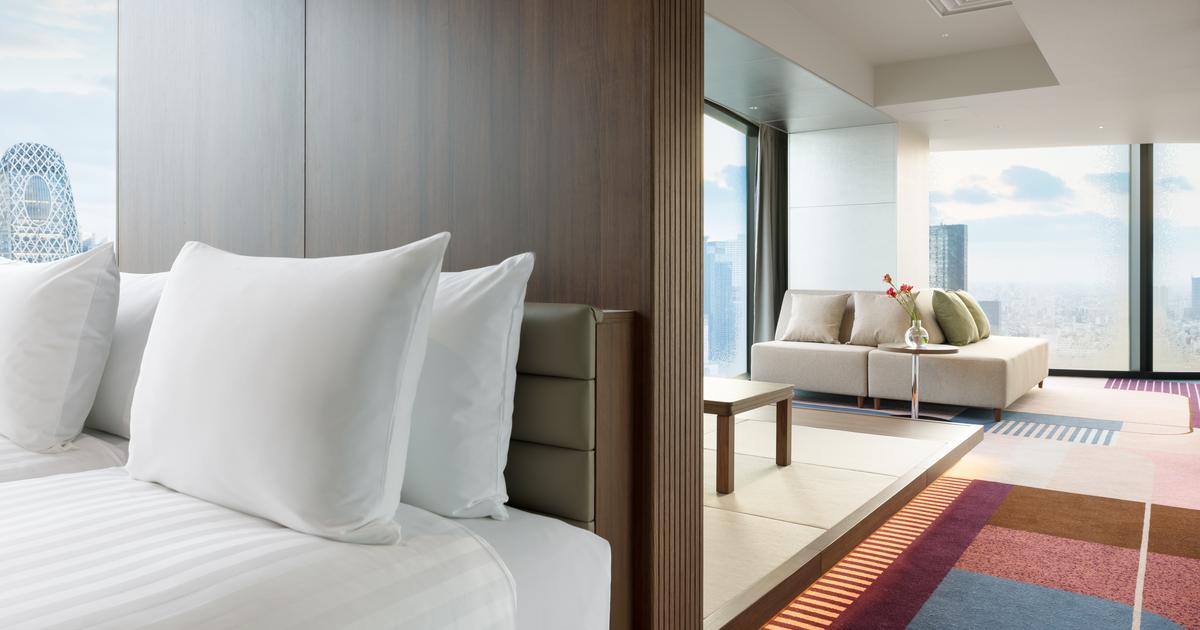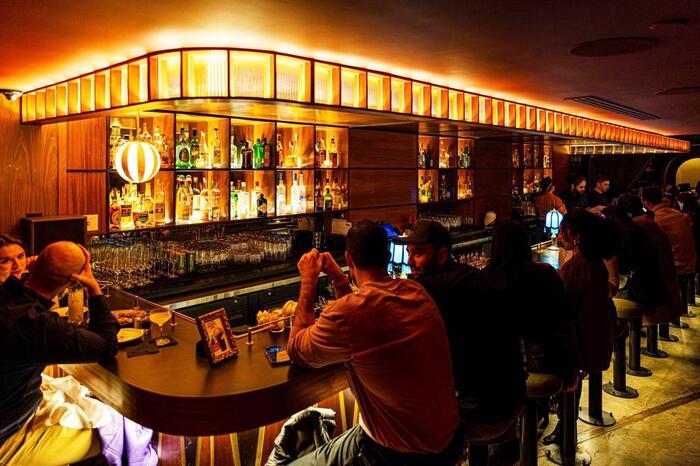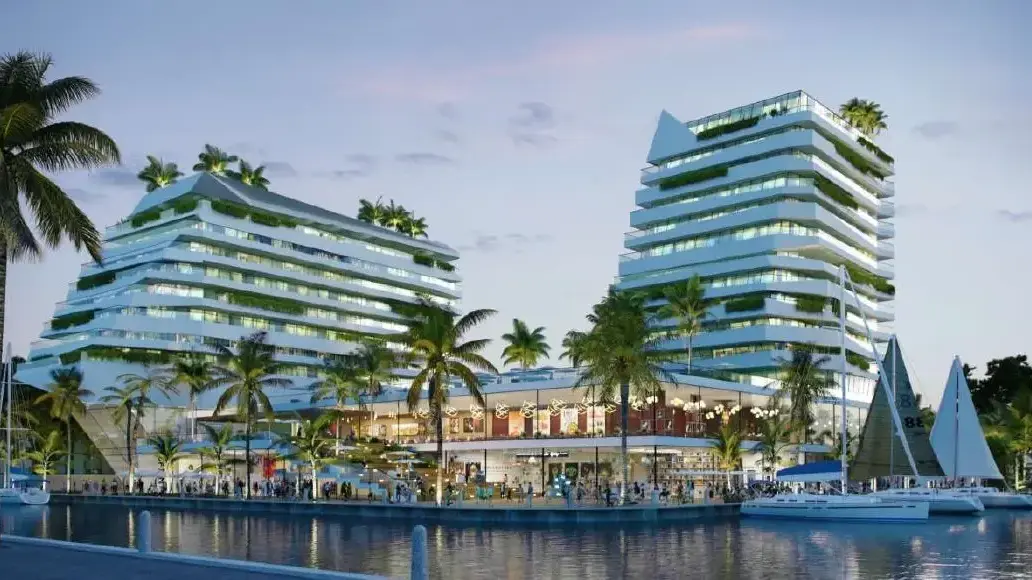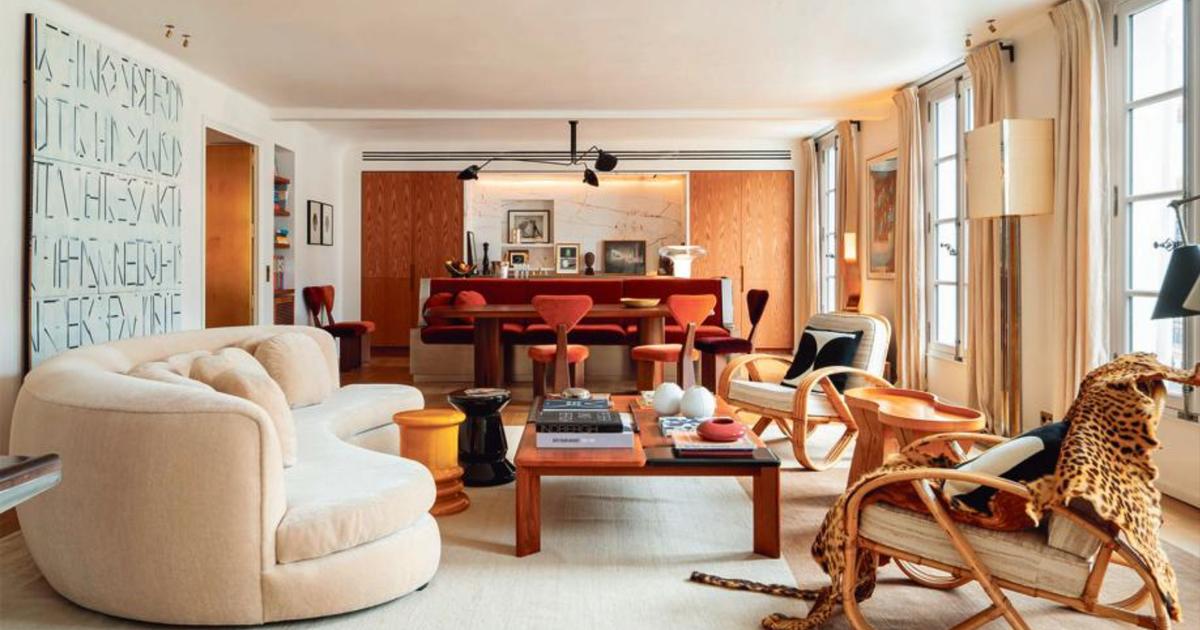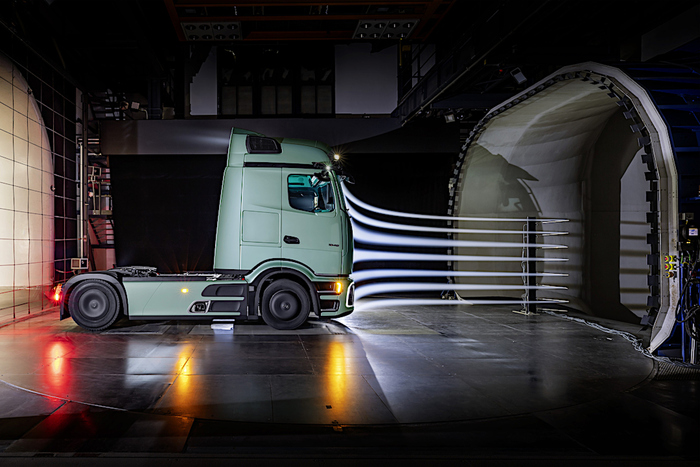Check out the first space hotel to open in 2027 1:10
(CNN) --
Waking up in a fancy hotel room with a view of the solar system could be the future of travel, at least if we leave it up to space company Orbital Assembly.
The American company revealed new information and concepts for its hotel, designs that have been "in orbit" since 2019.
The futuristic concept originally presented by the Californian company Gateway Foundation, and then called Von Braun Station, consists of several modules connected by elevators that make up a rotating wheel that orbits around the Earth.
The project is now run by Orbital Assembly Corporation, a space construction company that has cut ties with Gateway.
1 of 9
|
Space Hotel Designs: Orbital Assembly Corporation plans to build two space stations, Voyager and Pioneer.
Check out the gallery to learn more about Orbital Assembly's designs that showcase life among the stars.
→
2 of 9
|
Near future: Orbital Assembly plans for the Voyager station to hold up to 400 people and open in 2027, while the 28-person Pioneer station could be operational by 2025. Credit: Orbital Assembly
3 of 9
|
Earth in Space: Orbital Assembly's interior design is not unlike what you might see in a hotel on Earth, but with incredible views into space.
Credit: Orbital Assembly.
4 of 9
|
Sci-fi dream: "It's not going to be like you're going to a factory or a research center," Tim Alatorre, director of operations at Orbital Assembly told CNN Travel.
Instead, Alatorre said space stations should feel like a "sci-fi dream."
Credit: Orbital Assembly.
5 of 9
|
Pioneer Station Hall – This rendering shows what the interiors of Pioneer Station might have looked like.
Credit: Orbital Assembly
6 of 9
|
Space Basketball: Orbital Assembly will have some artificial gravity inside the stations, but in some of the spaces without it you can take advantage of fun games like space basketball.
Credit: Orbital Assembly
7 of 9
|
Expensive Industry: Space tourism has become a hot topic in recent years and is currently very expensive.
Orbital Assembly believes this could change over time.
"We're doing everything we can to make space accessible to everyone, not just the rich."
Credit: Orbital Assembly
8 of 9
|
Futuristic Vision: Opening dates of 2025 and 2027 depend on funding, but Alatorre and his team are confident in his futuristic vision.
Credit: Orbital Assembly
9 of 9
|
Time will tell: "For people who are naysayers or doubters, what I've always said is, 'Give us time. It's going to happen, but it's not going to happen overnight. And wait for us, try us. what we do as we go along and then they can judge.
Orbital Assembly's plan is to launch not one, but two space stations with accommodations for tourists: the Voyager station, the renamed original design, will now have the capacity to accommodate 400 people at launch in 2027, while the new concept for the station Pioneer will house 28 people, could be up and running in just three years.
advertising
The objective, according to Orbital Assembly, is to manage a space "industrial park" that has offices and accommodation for tourists.
Space tourism seems closer than ever: Last year, billionaire Virgin founder Richard Branson launched into suborbital space with his company Virgin Galactic, while Star Trek actor William Shatner became the person oldest in space thanks to an excursion with Blue Origin.
The golden age of space tourism is 'just around the corner'
But space travel still comes at a staggering cost, making it hard for many of us to even think about spending our vacations out of this world.
Tim Alatorre, director of operations at Orbital Assembly, believes this barrier will disappear once space tourism gains traction.
"The goal has always been to enable large numbers of people to live, work and thrive in space," Alatorre told CNN Travel in a new interview.
A home away from home
Orbital Assembly claims that the space stations will feature office space and accommodation.
Credit: Orbital Assembly
Alatorre says the appeal of the new Pioneer Station concept is that its smaller scale means it can be done sooner.
"It's going to give us the opportunity for people to start experiencing space on a larger scale, more quickly," he said.
Both the Pioneer Station and the Voyager Station will also have office and research facilities for rent.
According to Alatorre, Orbital Assembly wins, as many of its short-term goals depend on funding.
Orbital Assembly envisions both stations to function as a spinning wheel orbiting the Earth.
In a 2019 interview with CNN Travel, Alatorre explained that the Voyager station's physics work like a spinning bucket of water.
"The station rotates, pushing the contents of the station towards the ends, much like you can spin a bucket of water: the water pushes in and stays in place," he said.
Near the center of the station there would be no artificial gravity, but as you descend towards the outside of the station, the feeling of gravity will increase.
In principle his idea has not changed, Alatorre said more recently.
But, he explained, because Pioneer Station will be smaller, its gravity level will be different.
There will still be what he calls the "conveniences" of artificial gravity, such as showers, the possibility of eating and drinking sitting down... but spaces with less gravity will allow you to enjoy even more of the eccentricities of space.
Orbital Assembly envisions interiors not unlike those on Earth, but with incredible space views.
Orbital Assembly Credit
Images of the interiors of both stations suggest an interior design similar to that of a luxury hotel on Earth, but with out-of-this-world views.
Alatorre, who has an architecture background, previously said the hotel's aesthetic was a direct response to the Stanley Kubrick movie "2001: A Space Oddisey," which he called "almost a model of what not to do."
"I think Stanley Kubrick's goal was to highlight the divide between technology and humanity and so he purposely made the stations and the ships very sterile and clean and alien."
The space hotel's original name, Von Braun Station, was chosen because the concept was inspired by designs 60 years ago by Wernher von Braun, an aerospace engineer who pioneered rocket technology, first in Germany and later in the United States. .
While living in Germany, von Braun was involved in the Nazi rocket development program, so naming the space hotel after him was a controversial choice.
"The station has nothing to do with him. It's based on his design, and we like his contributions to science and space," said former Orbital Assembly CEO John Blincow, who is no longer associated with the company, in an interview with CNN Travel in 2021. "But Voyager Station is so much more than that. It's the stuff of the future. And we want a name that doesn't have those connotations."
"Not just for the rich"
Orbital Assembly says the concept isn't just for the rich.
Credit: Orbital Assembly
Visits to space have become more common in the last year, thanks to trips organized by Virgin Galactic, Blue Origin and Elon Musk's company, SpaceX.
Alatorre said his team has "talked to almost everyone" in the space industry about the collaboration.
"But the only thing missing from all these companies is the destination, right?" Alatorre said.
"It's kind of like if you want to go see the Grand Canyon and you see it in passing and you go home."
The International Space Station has hosted tourists in the past, including the world's first space tourist, Dennis Tito, in 2001. But Alatorre suggests the ISS is primarily a place of work and research, and Orbital Assembly's space hotel serves a different niche.
"It's not going to be like you go to a factory or a research center," he said.
Instead, it should feel like a "sci-fi dream."
"There are no wires everywhere, it's a comfortable space where you feel at home," he added.
As billionaires pump money into space, so is the backlash against space tourism, with many suggesting the money could be better spent on Earth.
In response to this criticism, Alatorre suggested that "many life-changing technologies" come from space exploration, such as GPS.
Space tourism: the differences between SpaceX, Virgin Galactic and Blue Origin missions
Alatorre also stated that living in space will imply creating "sustainable societies."
"These kinds of closed systems are going to change the culture, the way people think about using resources," he said.
"Our environment is not just Earth, it's the entire solar system. And there are so many resources out there, that when we start to use them and capitalize on them, that's going to change and improve the standard of living here on Earth."
Although at the moment the cost of a trip to space is high, according to Alatorre, space tourism will not be only for billionaires.
"We're doing everything we can to make space accessible to everyone, not just the rich," he said.
Besides cost, there are other hurdles to creating a space community, Alatorre said, such as calculating how much artificial gravity will be needed, and meeting current space radiation exposure guidelines.
But since tourists wouldn't necessarily stay for more than a couple of weeks, Alatorre suggested this wouldn't affect visitors, and would be more of a problem for those who work at the stations.
Jeffrey A. Hoffman, a former NASA astronaut who now works at MIT's Department of Aeronautics and Astronautics, told CNN Travel last year that a big obstacle to space tourism would be fear of safety.
But Hoffman suggested that, as with air travel, a consistent safety record will see the concept catch on, even with the continuing risk of accidents.
"I'm excited that many, many more people will be able to experience being in space, and I hope that they will bring to Earth a new sense of their relationship with our planet," said Hoffman, who suggested that word-of-mouth mouth will also be key.
"When word gets out and these early travelers tell their stories, you can't keep people away," he said.
Alatorre, for his part, believes that space tourism is just beginning.
"For people who are naysayers or doubters, what I've always said is, 'Give us time. It's going to happen, but it's not going to happen overnight. And wait for us, try us. And we'll show you what we do as we go. Let's move on and then they can judge."
Space Tourism Hotel

